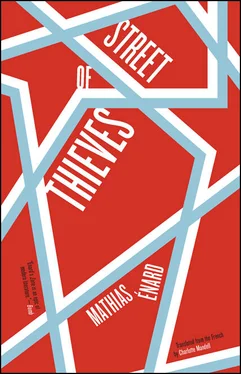Our tickets were handsome, though, in color and in Catalan, because I thought that looked more serious: Loteria Robadors was not, on the other hand, perhaps the best name in the world.
Still, the fact is that this Casanovan action brought us thirty euros (after checking that none of the tickets was the winning one, which would have been a catastrophe, or bankruptcy) from which we had to subtract some euros for a color copier to print a hundred tickets: enough to drink some coffee and lunch lavishly with Mounir, but that’s it.
I was a far cry from Casanova.
LOCKEDup waiting for violence: the month of April passed, between reading sessions, a few rare excursions to the beach (paradise peopled with pink-breasted Brits, Nordic girls blonde as the sand, Brazilians with provocative thongs) and soccer disappointments that were quite serious for my comrades but that didn’t affect me much — I was settled in my routine; I was still trying to remain vigilant, not to leave the neighborhood too much. I couldn’t lower my guard: Mounir had been arrested by a bad stroke of luck on Plaça de Catalunya when he was trying to snatch a tourist’s wallet. Of course he didn’t have his passport on him, he said he was homeless and a Palestinian from Gaza, which, according to him, was supposed to earn the sympathy of the boys in blue and make his expulsion more difficult. He spent a day in lockup before being released with a summons to appear at court the next day, with which he of course did not comply — he showed it to me, it was addressed to Mounir Arafat. When I asked him why he had chosen such a pseudonym, he answered it was the only purely Palestinian surname that had come to mind, which cracked us up. The interpreter sent to the police station had obviously glimpsed the hoax right away, but, Mounir said, he was a nice guy, a Syrian, who hadn’t given it away.
He’d been quite surprised: he was expecting a beating, but aside from a few friendly slaps and one or two humiliations, the fuzz had been pretty civil.
So Mounir was like me now, twice a fugitive, clandestine, and an established thief.
He knew that the next time, he wouldn’t get off so easily.
Aside from these legal delights, I had another cause for worry, more serious in another way: Judit’s state was becoming more and more alarming. She had almost stopped eating, spent her days in the dark because, she said, the light gave her migraines; the doctor wavered between diagnosing sinusitis and a pollen allergy, which would explain the congestion, aggravated by a depressive state. She was given masses of all kinds of medications and slept for most of the day. She no longer had the strength to concentrate on her Arabic classes: so I was content to visit her and stay with her for an hour or two. I would read her some texts, tell her a story from Ibn Battuta’s travels, and often she would fall asleep on the sofa, lulled by my voice, and woke only when I left. She told me she often had strange dreams, where she thought she was awake and struggling to find sleep: this obsession would pursue her until she actually awoke and realized that this insomnia was a dream.
Leaving Judit was heart-wrenching — I would always go down to Carrer Robadors on foot, to avoid any possible identity checks in the subway, that hostile underground world peopled with guards and muzzled dogs, and it took the entire trip to rid me somewhat of the sorrow and pain her condition caused me. Even if, according to her doctor, there was nothing alarming, just a passing weakness, a result of various factors, this illness was an unfair piece of shittiness that deprived me of the only presence that mattered to me.
So I began writing again — poems that were so bad compared to those of my role models that I destroyed them right away, which made this activity at least as distressing as the absence of Judit, locked away in her eternal drowsiness.
The world seemed suspended, arrested; I was waiting for it to topple over, for something to happen — its destruction in the flames of the Revolution, or a new blow of Fate.
Often, I would lunch alone in a little Moroccan restaurant on the Street of Thieves, where you could imagine you were in Tangier: same food, same waiters, same colors, it reminded me of the cafeteria where Sheikh Nureddin took us out to lunch after the Friday mosque, except now I went there alone; in the dining room a couple of junkies ordered a chorba for two, they sat side by side, shoulder to shoulder to support each other, and couldn’t even manage to finish the single dish.
The place filled me with nostalgia, and every time I was angry with myself: I had wanted to come to Barcelona, I didn’t come here to cry into my plate at the memory of Tangier. I thought of my mother, my family, Bassam of course.
I realized I wasn’t going to the mosque very often, just Fridays at noon, if that, from time to time. I read the Koran and its commentary, sometimes, it’s true, but less and less often. It was hard for me to find the concentration necessary for prayer; I felt as if I was no longer available for God, as if I were carrying out a mechanical imitation. Faith was a dead skin that Cruz and reading books had sloughed off me; all that was left to me was religious practice that seemed very empty, simple prostrations done by rote.
Sometimes I got caught up in imagining myself in Paris, or Venice; if I’d had a passport in order I’d have liked to go there: Paris to buy some thrillers, see the Seine; Venice to visit Casanova’s city, discover the sites of his escapades, navigate the lagoon.
At no time, in his travels, does Ibn Battuta speak of a passport, or papers, or safe-conducts; he seems to travel as he pleases and to fear nothing but bandits, just as Saadi the sailor feared pirates. It was distressing to think that today, if you were a murderer, a thief, or even just an Arab, you couldn’t so easily visit La Serenissima or the City of Light. I thought for a while of using the networks on the Street of Thieves to establish a new identity for myself, but what I knew purely from the experience of books is that it was very difficult and often not very effective, things being as they were, unless you chose a Libyan, Sudanese or Ethiopian passport and that too, without the shimmering bronze sticker of the Schengen visa, was good for nothing. If it weren’t for Judit, I think I’d have tried my chances, I’d have gone back to Algeciras, tried to cross illegally through customs in the other direction, which must not have been very complicated, and once in Morocco I would just have had to pray that the customs officers of the Motherland had never heard of me and would let me return to the cradle. Then, I’d have settled in Tangier with my loot, before returning to my dead soldiers and to Jean-François Bourrelier, the champion of typing by the kilometer. And a few years later, once my crimes had reached their statute of limitations, having gotten rich off of one million three hundred thousand dead poilus, I’d ask for a tourist visa to go to Venice and Paris, and that was it.
But I still had hope that one of my kisses would cure Judit of her illness, that one day she would wake up and decide to be with me again, full-time. And after all, despite the conditions, despite the great poverty of the Street of Thieves, I wasn’t that badly off — I just felt I was on a stopover; real life still hadn’t begun, it was endlessly postponed: deferred at the Propagation for Koranic Thought, which disappeared in flames; delayed on board the Ibn Battuta, lost craft; put off at chez Cruz, dog among dogs; suspended in Barcelona at the mercy of the crisis and Judit. On the run, always. There were accounts that still weren’t settled and today, in my noisy monastery, my convent of thieving dervishes, when everything outside has burned, Europe, the Arab world, when flames have devoured the books, when hatred has invaded us, destroying the world of yesterday with the furious doggedness of stupidity, when the dogs are growling, attacking blindly to kill each other, the last weeks on the Street of Thieves seem to me like a somber happiness, the edge of a razor, and you don’t know whose throat it’s going to cut: just as the tightrope walker must defy the possibility of falling in order to concentrate on his footsteps — he looks in front of him, gently maneuvers the pole that saves him from the abyss, advances toward the unknown — I was walking without thinking about the fate that had pushed me toward Barcelona; like an animal, I could sense the storm to come, around me, inside me, while at the same time putting it all out of mind so I’d be able to cross the void.
Читать дальше












